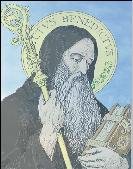Quote from Pope Urban VIII/Medjugorje
Pam, maybe our Lady was speaking to your heart, letting you know that she is by your side in this fight to defend her. It is no accident that you were looking at that window and were enlightened. 
Devotion to the souls in Purgatory contains in itself all the works of mercy, which supernaturalized by a spirit of faith, should merit us Heaven. de Sales
- KevinSymonds
- Posts: 887
- Joined: Thu Jul 06, 2006 8:38 am
Pam,
-I have put some brain energy into your question and I think I have come up with a reasonable response. I have to take it in stages so please bear with me. I provided a summary at the end so if you want the quick answer, go straight to the bottom.
Let us begin with what we do know.
1) Pope St. Pius X upheld Pope Urban VIII's decree "Sanctissimus Dominus Noster" on publishing alleged private revelations.
2) That decree states that no book of such nature can be published without the local Bishop's permission.
3) Pius' direct and immediate subject is "pious traditions", not specifically apparitions The context is things like relics and only later does Pius specifically mention apparitions. We can thus conclude that apparitions are considered under "pious traditions" in Pius X's mind.
That much we know for sure just from the terms of Pascendi and simple history. Let's look at other things we know.
4) In 1978, the Congregation for the Doctrine of the Faith issued a document that provided rules and guidelines for Bishops to follow.
5) This document ('1978' for short) provides positive and negative criteria to look for in discerning an alleged private revelation.
6) 1978 explictly states that the positive and negative criteria for discernment were "indicative standards and not final arguments." In other words, 1978 is a basic document, not exhaustive. Theological specialization is necessary in the field of private revelation.
7) 1978 summarizes the tradition of discerning private revelation but is not exhaustive.
8) 1978 gives a three-tiered structure by which approbation of private revelations can go through:
a) Initial investigations
b) Approval for publication by the Bishop to see greater fruits if nothing is opposed to it after step A
c) Judgment on character of the claims (supernatural or not).
Ok, that's what we do know so far. So let's put this all together.
The statement of Pope St. Pius X that you are having difficulty with is as follows:
"...and even then she does not guarantee the truth of the fact narrated; she simply does but forbid belief in things for which human arguments are not wanting. On this matter the Sacred Congregation of Rites, thirty years ago, decreed as follows: These apparitions and revelations have neither been approved nor condemned by the Holy See, which has simply allowed that they be believed on purely human faith, on the tradition which they relate, corroborated by testimonies and documents worthy of credence."
I believe that what St. Pius X intended by this statement was that even if a book is published on a pious tradition (such as apparitions, relics, etc.) with Pope Urban VIII's declaration, the Church does not forbid the pious tradition when she has not made a specific judgment. However, the faithful run the risk of danger when they believe in something the Church has not endorsed by her authority.
It is a simple case of putting the cart before the horse.
In summary:
The statement in question of Pascendi 55 is a 'prototype' of steps A through C in the later 1978 document. There are stages of approval and approbation of a claim. Pius X was basically saying that if nothing is opposed to the telling of pious traditions in books, they may be published but with the decree of Pope Urban VIII clearly printed with the book to warn the faithful.
"Nothing is opposed" meaning there is nothing contrary to Faith and Morals (F&M) or contradictory evidence not dealing with F&M.
"Forbid belief in things for which human arguments are not wanting" means that the Church forbids the faithful to believe in a pious tradition when it has some contradicting elements that spur human argumentation. In other words, when it is clear something is not supernatural, the Church forbids belief. Where there is open question and no Church endorsement, the faithful can believe it on "purely human faith."
Pius X was not saying we give the assent of Faith in Divine Revelation that is required by all Catholics. Rather, he meant we believe on a purely human level in a claim and run the risk of being wrong where the Church has not endorsed the pious tradition with her authority.
Remember, however, that the 1978 document is the ruling document current in Church legislation, not Pascendi. What is in Pascendi was, in a way, superceded by 1978, though I think it better to say 1978 is constructed upon Pascendi's principles, which come from the tradition.
Hope that helps.
Peace!
-Kevin
-I have put some brain energy into your question and I think I have come up with a reasonable response. I have to take it in stages so please bear with me. I provided a summary at the end so if you want the quick answer, go straight to the bottom.
Let us begin with what we do know.
1) Pope St. Pius X upheld Pope Urban VIII's decree "Sanctissimus Dominus Noster" on publishing alleged private revelations.
2) That decree states that no book of such nature can be published without the local Bishop's permission.
3) Pius' direct and immediate subject is "pious traditions", not specifically apparitions The context is things like relics and only later does Pius specifically mention apparitions. We can thus conclude that apparitions are considered under "pious traditions" in Pius X's mind.
That much we know for sure just from the terms of Pascendi and simple history. Let's look at other things we know.
4) In 1978, the Congregation for the Doctrine of the Faith issued a document that provided rules and guidelines for Bishops to follow.
5) This document ('1978' for short) provides positive and negative criteria to look for in discerning an alleged private revelation.
6) 1978 explictly states that the positive and negative criteria for discernment were "indicative standards and not final arguments." In other words, 1978 is a basic document, not exhaustive. Theological specialization is necessary in the field of private revelation.
7) 1978 summarizes the tradition of discerning private revelation but is not exhaustive.
8) 1978 gives a three-tiered structure by which approbation of private revelations can go through:
a) Initial investigations
b) Approval for publication by the Bishop to see greater fruits if nothing is opposed to it after step A
c) Judgment on character of the claims (supernatural or not).
Ok, that's what we do know so far. So let's put this all together.
The statement of Pope St. Pius X that you are having difficulty with is as follows:
"...and even then she does not guarantee the truth of the fact narrated; she simply does but forbid belief in things for which human arguments are not wanting. On this matter the Sacred Congregation of Rites, thirty years ago, decreed as follows: These apparitions and revelations have neither been approved nor condemned by the Holy See, which has simply allowed that they be believed on purely human faith, on the tradition which they relate, corroborated by testimonies and documents worthy of credence."
I believe that what St. Pius X intended by this statement was that even if a book is published on a pious tradition (such as apparitions, relics, etc.) with Pope Urban VIII's declaration, the Church does not forbid the pious tradition when she has not made a specific judgment. However, the faithful run the risk of danger when they believe in something the Church has not endorsed by her authority.
It is a simple case of putting the cart before the horse.
In summary:
The statement in question of Pascendi 55 is a 'prototype' of steps A through C in the later 1978 document. There are stages of approval and approbation of a claim. Pius X was basically saying that if nothing is opposed to the telling of pious traditions in books, they may be published but with the decree of Pope Urban VIII clearly printed with the book to warn the faithful.
"Nothing is opposed" meaning there is nothing contrary to Faith and Morals (F&M) or contradictory evidence not dealing with F&M.
"Forbid belief in things for which human arguments are not wanting" means that the Church forbids the faithful to believe in a pious tradition when it has some contradicting elements that spur human argumentation. In other words, when it is clear something is not supernatural, the Church forbids belief. Where there is open question and no Church endorsement, the faithful can believe it on "purely human faith."
Pius X was not saying we give the assent of Faith in Divine Revelation that is required by all Catholics. Rather, he meant we believe on a purely human level in a claim and run the risk of being wrong where the Church has not endorsed the pious tradition with her authority.
Remember, however, that the 1978 document is the ruling document current in Church legislation, not Pascendi. What is in Pascendi was, in a way, superceded by 1978, though I think it better to say 1978 is constructed upon Pascendi's principles, which come from the tradition.
Hope that helps.
Peace!
-Kevin
- KevinSymonds
- Posts: 887
- Joined: Thu Jul 06, 2006 8:38 am
Well, I said I would and so I'm going to deliver. I said that I would give some discussion on Pope Urban VIII's Bull "Sanctissimus Dominus Noster."
I've updated the Urban VIII entry on wikipedia.com. Look for the "Private Revelation" section.
http://en.wikipedia.org/wiki/Pope_Urban_VIII
Let me know what you think.
Peace!
-KJS
I've updated the Urban VIII entry on wikipedia.com. Look for the "Private Revelation" section.
http://en.wikipedia.org/wiki/Pope_Urban_VIII
Let me know what you think.
Peace!
-KJS


